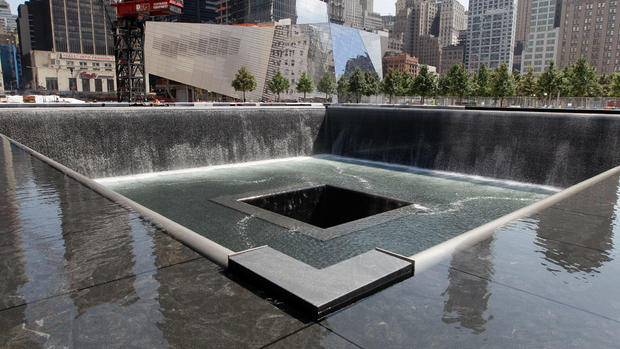9/11 documentary update focuses on health crisis
The landmark documentary, "9/11," that aired exclusively on CBS six months after 9/11, showed the only known video of the first plane hitting the World Trade Center, along with footage from inside the Twin Towers. Filmmaker Jules Naudet was inside following the firefighters as they rushed into Tower 1 just after the plane hit.
9/11 firefighter in the battle of his life
Special section: 9/11 10 years later
The filmmakers have recently interviewed the firefighters and updated the documentary. The film, "9/11: Ten Years Later" will air this Sunday at 8 p.m EDT on CBS.
On "The Early Show" Thursday, three of the executive producers of the documentary "9/11: Ten Years Later," firefighter James Hanlon, along with Jules Naudet and Gedeon Naudet, discussed how the film had changed.
Hanlon said the biggest change in the updated film is the health aspect of the firefighters' lives since 9/11.
He said, "You know, it was about a year and a half ago that I remember making a phone call to one of the firefighters who is in the documentary and was at the '93 bombing, was there that day, went as high as the 35th floor and made the command to get out, and I called him up and I said 'How are you doing?' And we found out that he had cancer, and I remember calling Jules and Gedeon saying, 'I have bad news.' We knew right then at the moment that the new update was kind of going to, well not kind of, but it was going to concentrate on the health issues, which has really come to the forefront."
"Early Show" co-anchor Chris Wragge asked, "Is that the primary focus now? Because there's been so much talk of about the Zadroga bill, the responders who spent significant time at ground zero in immediate months after the attacks that are now suffering. Is that where this picks up, what's happened to a lot of the people that spent so much time and effort in the recovery process?"
"It's part of it," Hanlon said. "I mean, if you think of 210 story buildings pulverized in 10 seconds, you know, 40,000 light bulbs, mercury, benzene found down there, all this toxic brew, and everybody working within it. The Zadroga bill left out cancers and all of these guys are getting cancers, and as we see it's coming up. But we deal with so many other issues within this fifth act now."
The film, Jules Naudet said, also tells the story of how the firefighters have coped over the years with the day's tragedy.
He said, "It's interesting to see how different personalities have dealt with it, whether some have had their lives destroyed by it. Others were able to transform it into something positive. For example, (Batallion Chief Joseph Pfeifer) who had lost his brother on September 11 made it his mission to rebuild the fire department and help out in any way he can. (Tony, the kid) we had followed in these months is now a father himself and now, so I think they understood, they wanted to tell their stories, where are they 10 years later and felt a little bit forgotten, even though we always say 'never forget.'"
Gedeon Naudet said every time he watches the film he experiences the same reaction. He said, "It's still the same reverence and astonishment to the braveness and the courage that the firefighters, and all the first responders showed on that day, and that's such a lesson of life, every single time we watch the film, it's extraordinary."
He added, "I mean we are all New Yorkers here, so we have a strange way of dealing with each other in good times, but the good feeling is that when everything goes wrong, this city has this way of pulling together and we've showed that so many times before. I'm convinced an optimistic we'll show that again in the future."
